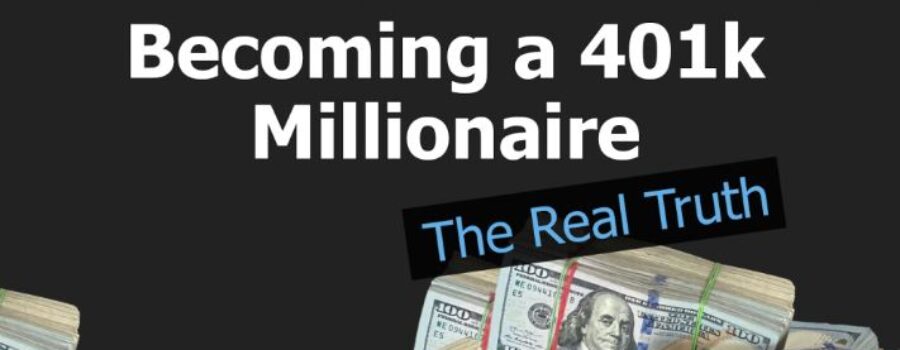Do You Want to become a 401(k) OR ROTH IRA millionaire?
Want to be a millionaire?
Look at the behavior of workers who have invested their way to seven-figure retirement accounts. One key characteristic among them is patience.
The number of people with $1 million or more increased to 485,000, a 43 percent jump from the same three months last year, according to Fidelity, one of the nation’s largest administrators of workplace retirement accounts. The company provides a quarterly analysis of 45 million individual 401(k), 403(b) and IRA retirement accounts.
Here’s what it takes to reach millionaire status.
These aren’t microwave millionaires. They know it takes time to grow their portfolios. They have been investing in their plans for an average of 26 years, with an average balance of $1.58 million.
As can be expected, the millionaires are predominantly Gen X (individuals born between 1965 and 1980) and baby boomers (born between 1946 and 1964). The average age is just shy of 59 years old.
Setup a Roth IRA such capital gains are not taxed when you start taking money out after age 59 1/2.
As your earnings increase, contribute as much as you can. The contribution limit for employees who participate in 401(k), 403(b) and most 457 plans, as well as the federal government’s Thrift Savings Plan, increased to $23,000 for 2024, up from $22,500 last year. If you are 50 or older, a catch-up provision allows you to contribute an extra $7,500 for a total limit of $30,500 to an employer-sponsored retirement plan.
They grab the match
If there’s a company match, 401(k), millionaires take advantage of the benefit.
Over the last 12 months, 81 percent of workers in a 401(k) and 403(b) received some type of employer contribution either through company match or profit-sharing, according to Fidelity.
The most popular match is a dollar-for-dollar match on the first 3 percent and then 50 cents on the dollar on the next 2 percent.
They don’t panic at market downturns
These investors don’t let turbulence in the stock market or bear markets — a period of falling stock prices — chase them away from equities. In fact, they see tumbling markets as a flash sale. It’s an opportunity to buy more stock shares at lower prices.
They leave the money alone
Understandably, when money is tight, many workers look to their retirement accounts for a bailout.
Keep your retirement money invested. Don’t cash out when changing jobs, a move that would result in a 10 percent early withdrawal penalty if you are under 59½ years old.
If you can, leaving the money to grow gives you the best opportunity to become a millionaire. It’s a slow and steady pace that may not be exciting, but it has allowed ordinary investors to become extraordinarily wealthy.

